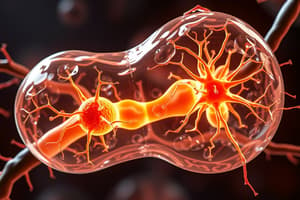Podcast
Questions and Answers
What is the primary end product of glucose breakdown in respiration, aside from energy?
What is the primary end product of glucose breakdown in respiration, aside from energy?
- Glucose
- Oxygen
- Urea
- Carbon dioxide (correct)
Which statement about the process of respiration is correct?
Which statement about the process of respiration is correct?
- All steps of respiration occur in the mitochondria.
- Only heat energy is released during glucose breakdown.
- Enzymes catalyze each step of the breakdown of glucose. (correct)
- Respiration is completed in a single chemical reaction.
What role do proteins or fats play if carbohydrates are not directly available for energy?
What role do proteins or fats play if carbohydrates are not directly available for energy?
- They are stored as metabolic reserves.
- They can be broken down to provide energy. (correct)
- They are completely unnecessary for energy.
- They are converted to glycolysis intermediates.
How much ATP is released from the breakdown of one mole of glucose?
How much ATP is released from the breakdown of one mole of glucose?
Which function does energy produced from respiration NOT support?
Which function does energy produced from respiration NOT support?
What is the significance of ATP in cellular processes?
What is the significance of ATP in cellular processes?
In terms of energy, how do animals differ from plants?
In terms of energy, how do animals differ from plants?
What primarily catalyzes the steps involved in respiration?
What primarily catalyzes the steps involved in respiration?
Flashcards are hidden until you start studying
Study Notes
Respiration
- A vital process for all organisms
- Occurs continuously throughout life
- Involves breaking down glucose for energy
- Requires oxygen
Chemical Reaction of Respiration
- $C_6H_{12}O_6 + 6O_2 \rightarrow 6CO_2 + 6H_2O + energy$
- Occurs inside living cells (tissue)
- Glucose breakdown happens in a series of steps
- Some steps occur in the cytoplasm, others in the mitochondria
- Each step of the breakdown is catalyzed by a specific enzyme
- Energy released during glucose breakdown is not all heat, a majority is converted to ATP (Adenosine Triphosphate)
- One mole of glucose produces 38 molecules of ATP
- ATP acts as the "energy currency" within a cell
Animals Need More Energy than Plants
- Animals need more energy than plants for physical activities
- Birds and mammals also need energy to regulate body temperature
Glucose and Respiration
- Simple carbohydrates provide the main energy source for cellular functions
- If carbohydrates are not available, proteins and fats are broken down for energy
- Animals that rely on proteins for food have extra amino acids that convert to Urea through digestion
- Glucose can be used immediately or stored as glycogen for future energy demands
Energy Use by Body cells
- Synthesis of proteins from amino acids
- Production of enzymes
- Muscle contraction
- Nerve impulse conduction
- New cell production
- Maintaining body temperature (primarily for warm-blooded animals)
Studying That Suits You
Use AI to generate personalized quizzes and flashcards to suit your learning preferences.




